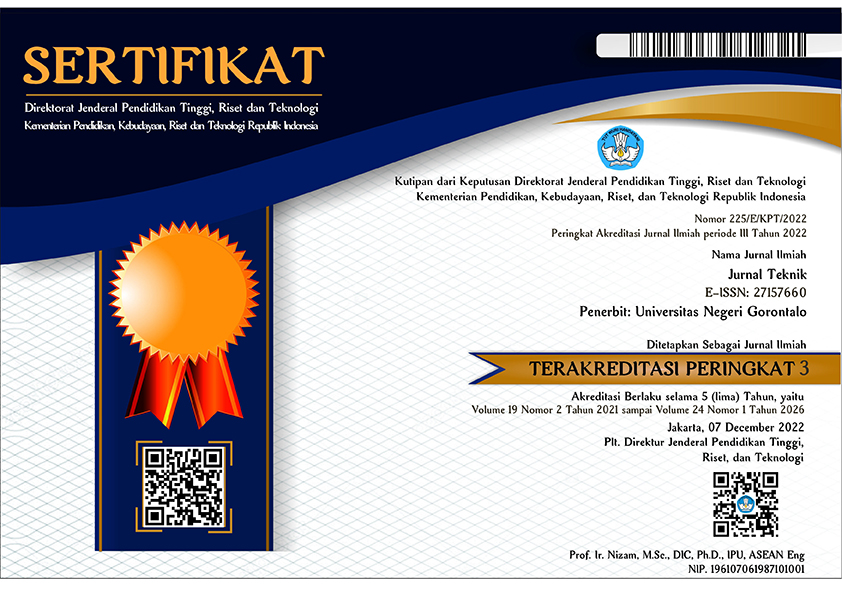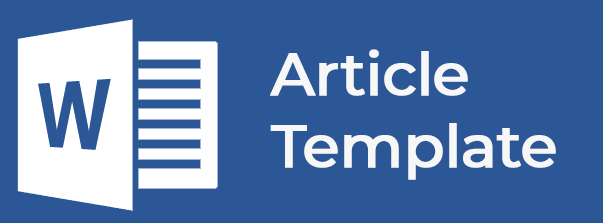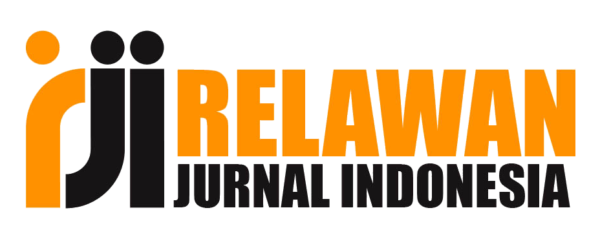Pemanfaatan Abu Serabut Kelapa dan Serbuk Cangkang Telur Terhadap Kuat Tekan Beton
Abstract
Indonesia is the largest coconut fiber producing country in the world and has not been able to process it optimally. Egg shell waste is also one of the wastes that is often encountered because many food raw materials use eggs. This research was conducted to determine the value of the compressive strength of concrete with the addition of coconut fiber ash and eggshell powder as a substitute for cement and which of the percentages of 0%, 0.5%, and 1.5% added mixture has optimal compressive strength for concrete quality. K – 225 or equivalent to 19.3 MPa at 28 days of age. The method used in this study is an experimental method according to SNI 03-2834-2000 concerning Procedures for Making Plans for Normal Concrete Mixture. The results of this study revealed that the addition of coconut fiber ash and eggshell powder to the concrete mixture decreased the compressive strength compared to normal concrete but not significantly. The average compressive strength value of normal concrete is 19.58 MPa. Whereas the compressive strength of concrete with the highest added material is the percentage of 0.5% coconut fiber ash and 0.5% eggshell powder with an average compressive strength of 19.30 MPa.
Downloads
References
Affandy, N. A., & Bukhori, A. I. (2019). Pengaruh Penambahan Abu Serabut Kelapa Terhadap Kuat Tekan Beton. Universitas Islam Lamongan, 3(2), 52–56.
Agustapraja, H. R., & Dhana, R. R. (2021). The Effect of Newspaper Powder on Structural Concrete Pressure Fc ’21, 7 Mpa. IOP Conference Series: Earth and Environmental Science, 830(1). doi:10.1088/1755-1315/830/1/012002
Ardhiansyah, M. D. (2018). Pengaruh Pemanfaatan Sabut Kelapa Sebagai Material Serat Terhadap Kuat Tekan dan Daya Serap Beton (The Influence of Using Coconut Fibers As Fiber Materials to the Compression Stress and Absorbent of Concrete). Universitas Islam Indonesia, 1–114.
ASTM C 187-86. (n.d.). Normal Consistency Of Hydraulic Cement.
Błaszczyński, T., & Król, M. (2015). Usage of Green Concrete Technology in Civil Engineering. Procedia Engineering, 122(January), 296–301. doi:10.1016/j.proeng.2015.10.039
Falahiyah. (2015). Adsorpsi Methylene Blue Menggunakan Abu Sabut dan Tempurung Kelapa Teraktivasi H2SO4. Universitas Islam Negeri Maulana Malik Ibrahim.
Fitriani, S., M, W. M. F., & Farida, I. (2017). Penggunaan Limbah Cangkang Telur , Abu Sekam , dan Copper Slag Sebagai Material Tambahan Pengganti Semen. Jurnal STT-Garut All Right Reserved, 15(1), 46–56. doi:http://journals.sttgarut.ac.id
Klau, A. S., Phengkarsa, F., & Sanggaria, O. J. (2021). Pemanfaatan Limbah Cangkang Telur Sebagai Bahan Substitusi Semen Pada Beton. Paulus Civil Engineering Journal, 3(4), 479–488.
Majid, A., & Rofiqi Agustapraja, H. (2021). The Effect Of Adding Cement Waste On The Quality Of Concrete Compressive The Effect Of Adding Cement Waste On The Quality Of Concrete Compressive. Civilla J. Tek. Sipil Univ. Islam Lamongan, 6(2), 213. doi:10.30736/cvl.v2i2
Rajasa, G. I. S. (2019). Kuat tekan menggunakan variasi penambahan kleled ( limbah pengecoran logam ) sebagai pengganti komposisi pasir dari Ceper Klaten sebagai agregat halus. Jurnal Sains Dan Teknologi, 15(2), 126–129.
Rohana, E. A. (2022). Pengaruh Penambahan Abu Serabut Kelapa Sebagai Pengganti Sebagian Semen Terhadap Kuat Tekan dan Kuat Tarik Beton. Universitas Islam Riau, 1–58.
Sasmita, G. A. J., Fernando, M. R., & Sugiharto, H. (2019). Pengaruh Subtitusi Parsial Semen dengan Cangkang Telur Ayam dan Fly Ash pada Karakteristik Mortar Beton. Universitas Kristen Petra Surabaya, 8(1), 79–86.
Sucahyo, I. A., Agustapraja, H. R., & Damara, B. (2020). PEMANFAATAN LIMBAH TEMPURUNG KELAPA SEBAGAI CAMPURAN PAVING BLOCK (Ditinjau dari Kuat Tekan dan Resapan Air). UKaRsT, 4(1), 1. doi:10.30737/ukarst.v4i1.708
Warsy, Sitti, C., & Waode, R. (2016). Telur Untuk Produksi Pasta Komposit. Jurnal Jurusan Kimia, Fakultas Sains Dan Teknologi , UIN Alauddin Makassar, 4(2), 86–97.
Copyright (c) 2023 Hammam Rofiqi Agustapraja, Fahrul Irfan Syah (Author)

This work is licensed under a Creative Commons Attribution-ShareAlike 4.0 International License.













